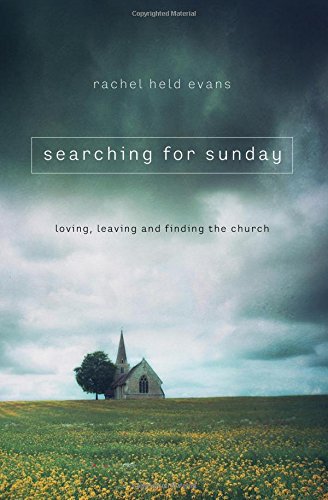Rachel Held Evans and I have had vastly different faith journeys. She was raised an evangelical in the American south, the daughter of a Bible professor. I was brought up Unitarian near fast-talking New York, the child of an ex-Catholic feminist. As she struggled with the culture and creed of her religion, I struggled with the lack in mine. And so it is a testament to both her writing ability and her way of getting to the heart of the matter that, in the pages of her latest book, Searching for Sunday: Loving, Leaving, and Finding the Church, I often found myself saying, “Yes. Me, too.”
Sunday is a tremendously courageous book. It is a thoughtful examination of Evans’ question-filled faith; an account of millennial frustration, Christian doubt, and a cautious optimism for the future of the church. Evans approaches her work with all the introspection of Lauren Winner and a warmth and authenticity reminiscent of Jen Hatmaker. Not just that, but she does so without compromising her own voice or the depth and quality of her story.
 Searching for Sunday: Loving, Leaving, and Finding the Church
Searching for Sunday: Loving, Leaving, and Finding the Church by Rachel Held Evans
Evans divides her book into short essays structured around the seven sacraments. These essays explore not only many facets of Christian life, but also her own story: one of grappling with the intersection of American “Christian” culture and her own liberal beliefs, and of doubt in the face of the world’s suffering. These are struggles that I, and many others, know well. On these grounds alone, Sunday is a worthwhile read: it will remind you that you are not alone.
But Sunday is also worthwhile for many other reasons. Evans provides truly beautiful reflections on seeking and the unique grief of losing a faith that once came easy. Combine that with her ability to reflect on Christian symbols with intelligent commentary and poetic grace, and you’ve got me hooked. I finished this book in two days.
That’s not to say that it is perfect. Like many other contemporary Christian authors, Evans has a habit of over-quoting the writers or thinkers she finds admirable, interspersing their words throughout her own. This is helpful for those looking to compile a reading list, but annoying for those of us who just want to hear Evans’ reflections in her own words. But this is a minor note, driven more by my wish to hear Rachel’s thoughts than anything else; the book remains thoughtful, compassionate, and authentic.
For those of you who have never doubted, who love the church and want to understand why people are leaving – this book is for you. For those of you who wonder why the church looks so unlike what you hoped for from a faith community – this book is for you. For those of you raised Christian and now struggling with doubt – this book is for you.
This is the book we’ve been waiting for.
Rating: 4.5/5 stars.





